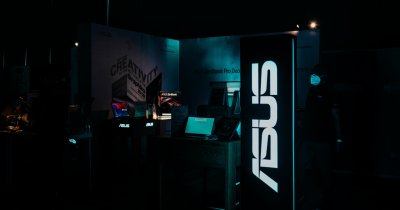This matters because it is not only the appliances and electronics that need to be green to make sure we hit our climate goals, but also the factories that make them should be equally sustainable to support the same purpose.
Nowadays, the company exports 84% of its whole production in over 80 countries.
We talked to Murat Büyükerk, CEO Arctic, about the company's sustainability efforts and how the new technologies implemented at the Ulmi factory improve production efficiency and help the environment.
How Arctic sees sustainability
We found from the CEO of Arctic that "the company’s sustainability framework is built on three pillars: curbing our footprint, supporting our communities, and improving our competitive edge. From our point of view, sustainability entails increased resource-use efficiency and greater adoption of clean and environmentally sound technologies and industrial processes."
To help with this purpose, Arçelik, Arctic's parent company, allocated 22.4 million euros in 2021 for the research and development of more eco-friendly products.
Circular economy is another important element in the process of designing new products, which is why Arctic is focusing on the durability, repairability and reusability of the company's products.
We were told that "Arctic’s focus on eco-design goes hand in hand with its commitment on reparability, this is why the company opened a regional spare parts hub in Arges County that will serve 23 countries."
Being an Industry 4.0 facility, the Ulmi plant implements some of the latest technologies and artificial intelligence algorithms to help boost production efficiency by as much as 30%.
Moreover, 70% of the production process is automated and quality control is completely handled by machines, as well.
"Our washing machines plant in Ulmi embodies our sustainability vision in Romania. It is the first Industry 4.0 production facility in Romania and one of the most modern in the world", Murat Büyükerk told us.
Empowering local communities, one of Arctic's goals
Company officials are looking to give back to the communities, as well, which is why they are taking social initiatives to help locals, for example by supporting medical services and the health staff in Romania, as well as vulnerable individuals and communities.
"We are also involved in dual education programmes and have launched projects to ensure gender equality and empower women. These goals include increasing women’s representation in engineering and R&D capacities, providing them with specified training and mentorship, and increasing female representation in leadership teams", we were told by Arctic's CEO.
The plans for a greener future
Arçelik Group, owner of Arctic, has set some ambitious targets for the year 2030 and some of the group's plans, which are also shared by Arctic, are the reduction of Scope 1, 2 and 3 carbon emissions by 50.4% when compared to 2018.
Also, Arçelik is looking to install some 50MW capacity of green power on a global level by making an investment of at least 50 million USD in renewables and energy efficiency, as well as purchasing only 100% green energy from suppliers.
We learned from Murat Büyükerk that "some other major targets are to reduce energy consumption and water withdrawal per product by 45% in all manufacturing plants (from 2015 baseline), increase the water recycling and reuse ratio to 70%, increase recycled plastic content to 40% and increase bio-based material content to 5%."
Sustainability challenges an appliance manufacturer faces
When it comes to the challenges of becoming a more sustainable company, Arctic's CEO is aware of the issues that might arise and believes that these can be tackled by improving the appliances and electronics we use on a daily basis.
"The top three sustainability challenges specific to the business are climate change, limited resources, and loss of biodiversity", Arctic's chief executive officer told us.
"To keep up with private household and industry demand for key natural resources such as water, fuel, raw materials, humans use greater quantities of Earth’s natural resources at a faster rate than ever before. That is why energy-efficiency is a priority for us and it plays such an important part in our sustainability strategy", he added.
Consumers seem to be more aware of the sustainable factor of a product when deciding to purchase new devices, according to Murat Büyükerk.
"Consumer habits have shifted to consider sustainability more than ever. To respond to these changing behaviors, we offer sustainable choices to encourage climate friendly living", he explained.
Investing in the company's employees
By continuously perfecting the capabilities of personnel, a company can ensure better performance when it comes to research and development, design and manufacturing of the products.
We learned by the chief executive that "human capital is our most valuable asset on our sustainability journey. In order to retain and develop existing talent we are working to increase the average training hours and convert 40% of training activities to online platforms."
Arctic also wants to empower women and offer them more opportunities when it comes to jobs and positions throughout the company.
"Our targets by 2030 include increasing the percentage of women in all management positions to 30%, - in junior management positions to 35%, in top management positions to 32% and in STEM-related positions to 38%", we were told.
At the same time, Arctic wants to work with partners and suppliers in order to help them set cllimate targets and track their progres in order for the company to become net-zero.
How Industry 4.0 technologies help Ulmi plant become more sustainable
We already mentioned about the automation processes that take place at the site and how they help improve on the efficiency, as over 200 robots work alongside humans, but there is more happening behind the scenes that makes this facility a truly sustainable one.
Murat Büyükerk shared with us that "Ulmi has 245 energy analysers, 9 natural gas meters, 42 water meters, 68 calorimeters, 62 compressed air flow meters and various sensors (daylight, presence, temperature, irradiation, CO2 etc.) that are used to optimize our production operations. In 2021 Arctic implemented 18 energy-efficiency projects saving 1,673 GJ."
At the same time, "the factory is partly powered by renewable energy, the photovoltaic system having produced over 2.6 million kWh so far, thus reducing carbon dioxide emission by around 835 tons", Arctic's boss explained. "Between 2019 and 2022 installed PV capacity was 930Kwp, approximately 12% of electricity usage."
Also, from 2023, the facility's solar panel system will have a peak output of 2300 kWh, which should be enough to supply around 15-20% of the required energy.
Improving the efficiency and sustainability of products
For its washing machines, the company is focused on making them as water efficient as possible and this is important especially as water scarcity becomes a more prevalent problem around the world.
We learned from company officials that, "to decrease our water withdrawal in all our manufacturing plants, we perform water efficiency, water recycling and reuse projects. At the Arctic Washing Machine Plant in Ulmi we saved 27,445 m3 of water last year by recycling and reusing wastewater and harvesting rainwater."
Regarding energy and water usage, Murat Büyükerk told us that "in terms of product stewardship, AquaTech (Beko) & WaterTouch (Grundig) washing machines consume 10% less energy than ‘A’ energy."
"As regards water usage per washing cycle, for an 8kg model with this technology, the weighted water consumption (L/cycle) is 35 liters, while for higher capacities, as 9 and 10kg, the weighted value is 40 liters", he added.
At the same time, Arçelik Group tries to implement as much recycled materials into its white goods in order to help relieve some of the pressure left by these materials on the environment.
Alongside improving energy and resource efficiency, this is another way companies can make a difference on nature, while delivering products that we rely on for our daily activities.
"A total of 7,216 tons recycled plastics and 34 tons bio-composite plastics were used in 2021 by Arçelik Group globally. In Arctic Washing Machine plant in Ulmi, approximately 186 tons of recycled plastic, 8 tons of industrial thread and 0.7 tons of fishnet were used in innovative products", Arctic's CEO shared with us.
 Mihai - Cristian Ioniță
Mihai - Cristian Ioniță












Any thoughts?